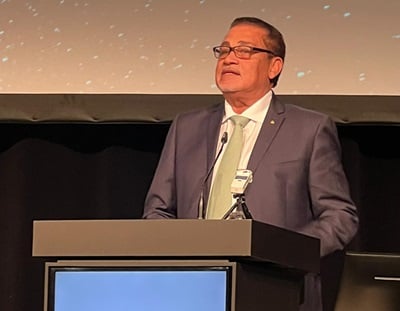Fearing the possible risk of contamination as Japan confronts a post-quake nuclear emergency, foreigners have begun a slow exodus from Tokyo, although some are maintaining a stiff upper lip.
Several European nations have advised their citizens to consider leaving the Japanese capital following two blasts at a quake-damaged atomic power plant 250km to the north, sparking fears of a possible meltdown.
France went further, telling citizens to leave the Tokyo area “for a few days” if they had no specific reason to stay and warning that if a reactor were to explode, radioactive steam could reach the city in a “matter of hours”.
“A third of our staff has left,” Stefan Huber, the Austrian deputy head of the European Union delegation in Japan, told AFP.
He said executives at several German companies such as Bosch, Daimler and BMW, as well as law offices, had evacuated their spouses and children, noting that in Tokyo’s German community “it’s a veritable exodus”.
Marissa, a dual Australian-Italian national who has lived in Tokyo for the past six years with her husband and two young children, decided on Sunday she was not taking any more chances and the family flew to Hong Kong.
“We just thought it was probably better to leave at this point in time… I don’t know about this nuclear issue, they don’t seem to have quite got it under control yet,” she told AFP, asking to be identified only by her first name.
She said a decision by Tokyo Electric Power Co. to institute rolling power cuts in her neighbourhood had been a major factor, noting: “I won’t be able to cook or give the kids a bath.”
Huber said an email sent on Sunday by the French embassy, in which it noted a warning from Japanese seismologists that a tremor with a magnitude of seven or higher was probable in the Tokyo region, had prompted many to leave.
“The German embassy on Sunday offered the dependents of its diplomats the possibility of leaving. They all left,” he said.
However, the German foreign ministry in Berlin said only a few diplomats’ families had left Tokyo.
At Audi’s office in Tokyo, a secretary said: “The office is closed this week because of the earthquake. Call back next week.”
The Japanese football team’s coach, Alberto Zaccheroni, and his staff flew home to Italy on Saturday, saying their families were “terribly worried” and needed to be assured they were alright. No return date has been fixed.
Not all nations are sounding the alarm, however.
“The British are very calm. For them, there is no danger,” Huber said.
The United States has also refrained from telling its nationals living in Japan to head home, simply recommending all non-essential travel be postponed.
When asked about the European warnings, US ambassador John Roos told reporters in Tokyo: “That has not changed the analysis of our country with regard to the guidance that was given to United States citizens.”
He advised nationals to “hear the instructions of the Japanese civil defence authorities”. So far, no Americans have been killed or seriously injured in the massive quake and devastating tsunami that struck Japan on Friday.
Foreign businesses in general seem to want to keep working, although perhaps with a more low-key presence.
Martin Jordy, president of Alcatel-Lucent Japan, said his company had suggested family members of employees could leave, but also “asked those who are working to stay, out of respect for the Japanese team”.
Jordy said the French telecoms equipment maker expected new orders following the quake, which damaged lines through northeastern Japan, saying: “The restoration of the network in the disaster zone will take months.”
Some, like French oil giant Total, have even offered to evacuate their Japanese staff from Tokyo to the south-western city of Fukuoka, where the company has rented a block of hotel rooms.
Marissa admitted she had mixed feelings about leaving. “I think we all feel a bit torn. Obviously all our Japanese friends are still there and we feel a little like we have abandoned them,” she said.
“We are just hoping we’ll all (be able to) go back as soon as possible. It’s a frustrating feeling.”
WHAT TO TAKE AWAY FROM THIS ARTICLE:
- Huber said an email sent on Sunday by the French embassy, in which it noted a warning from Japanese seismologists that a tremor with a magnitude of seven or higher was probable in the Tokyo region, had prompted many to leave.
- Several European nations have advised their citizens to consider leaving the Japanese capital following two blasts at a quake-damaged atomic power plant 250km to the north, sparking fears of a possible meltdown.
- Marissa, a dual Australian-Italian national who has lived in Tokyo for the past six years with her husband and two young children, decided on Sunday she was not taking any more chances and the family flew to Hong Kong.






















